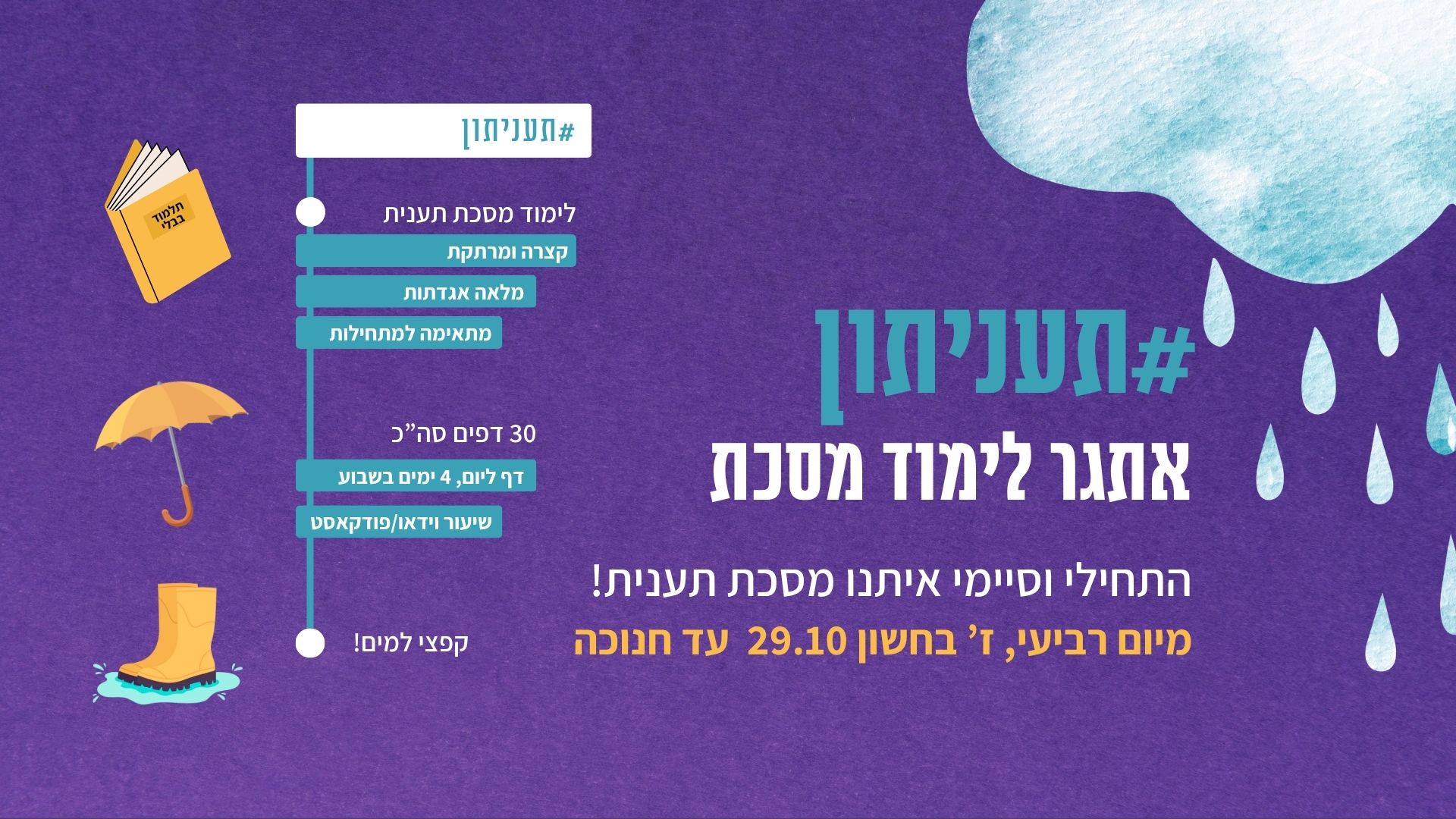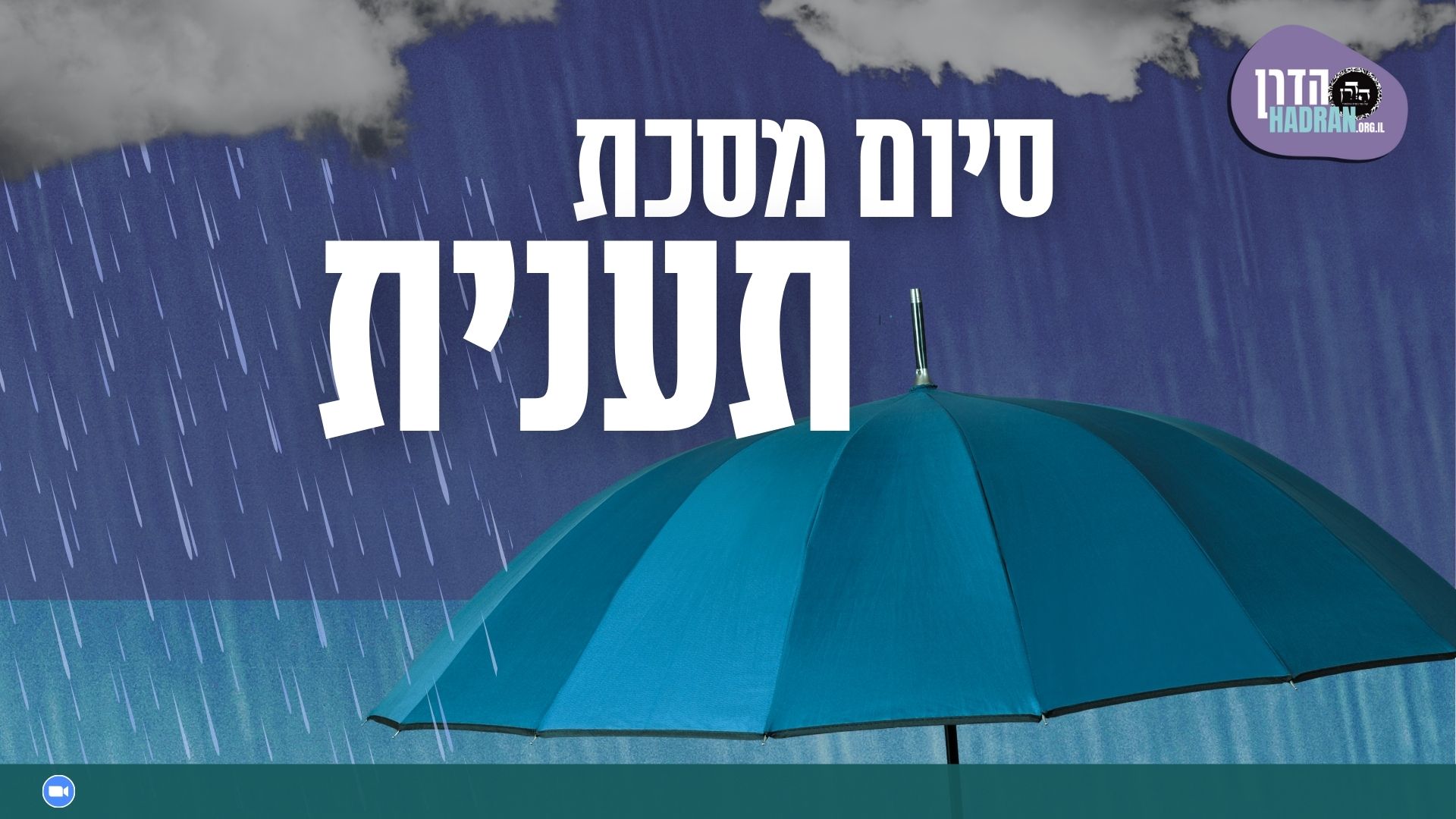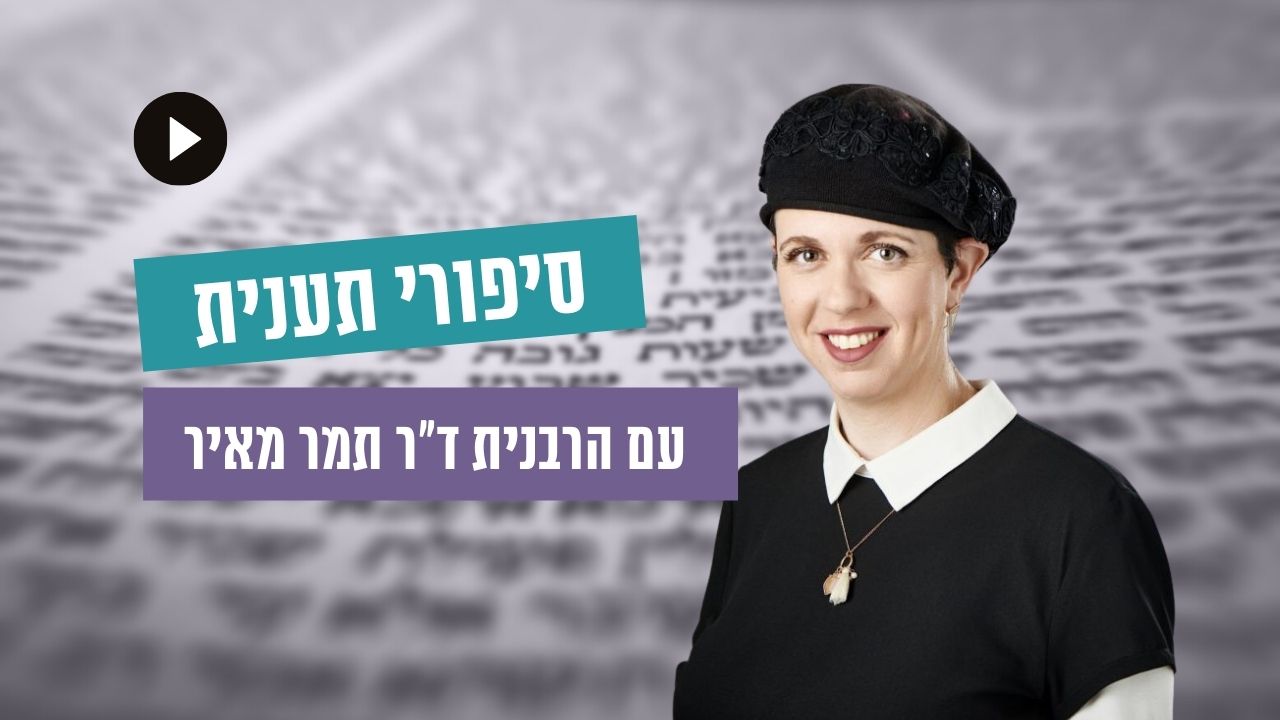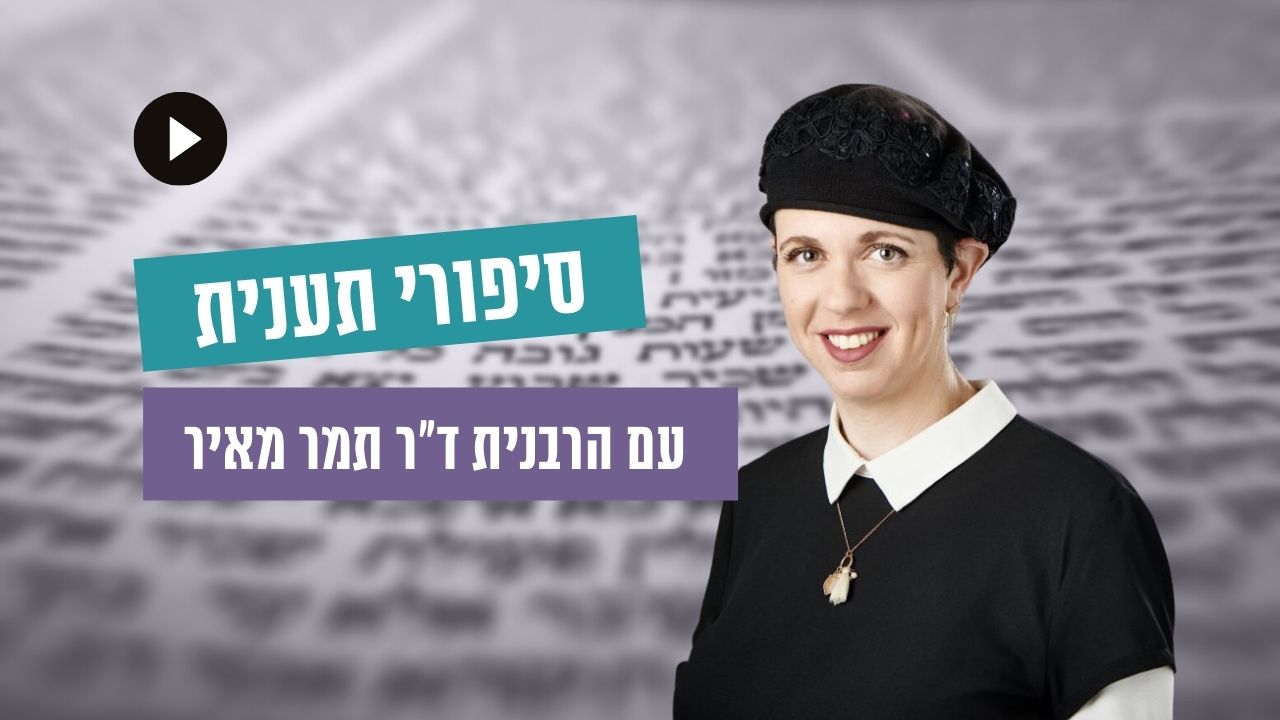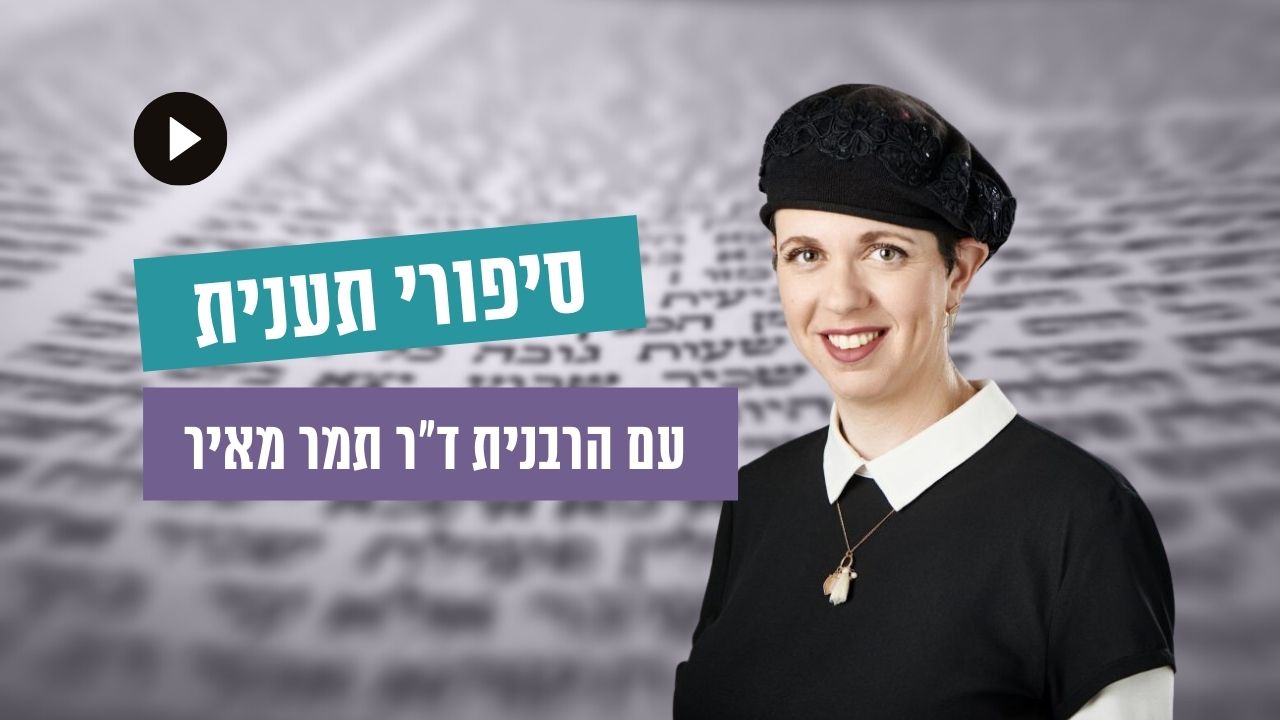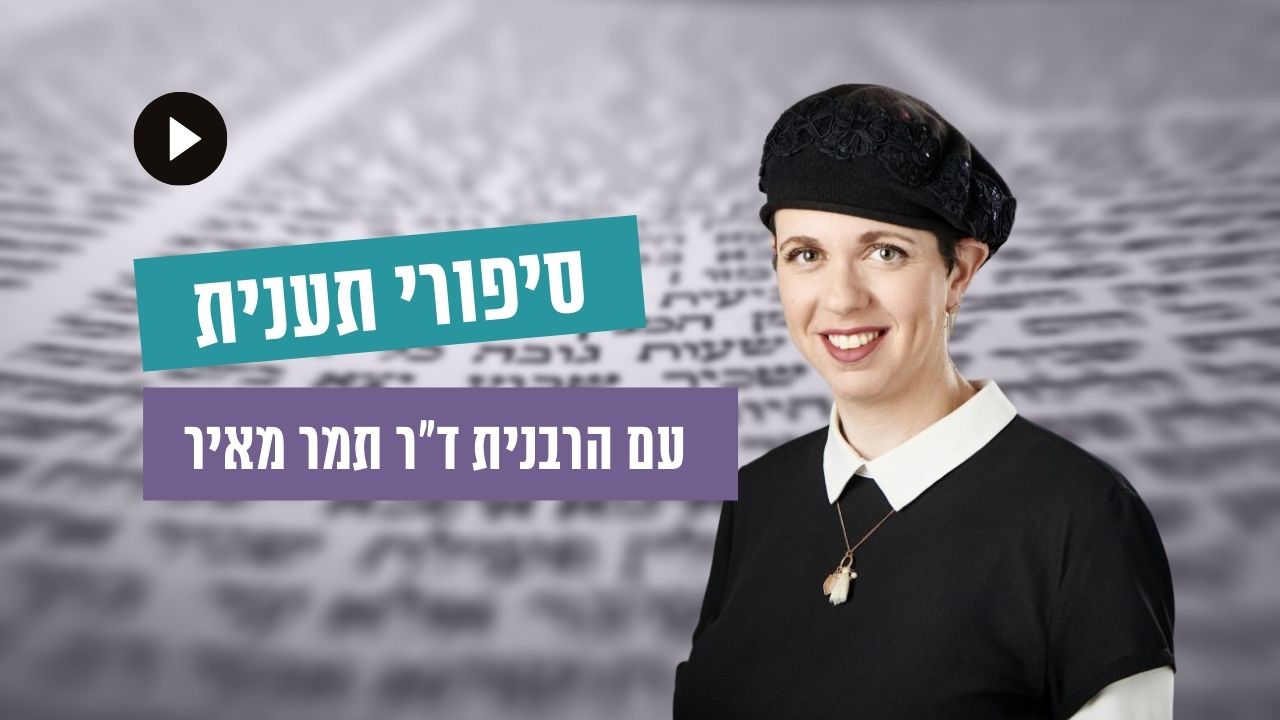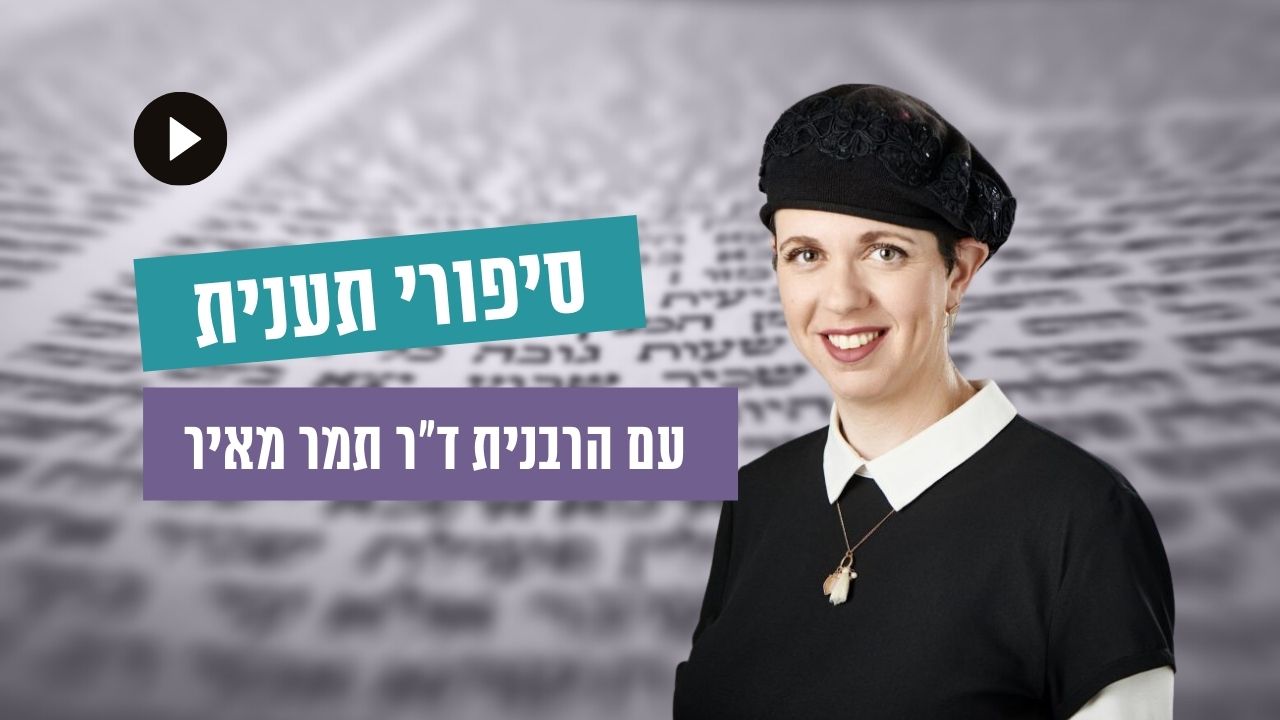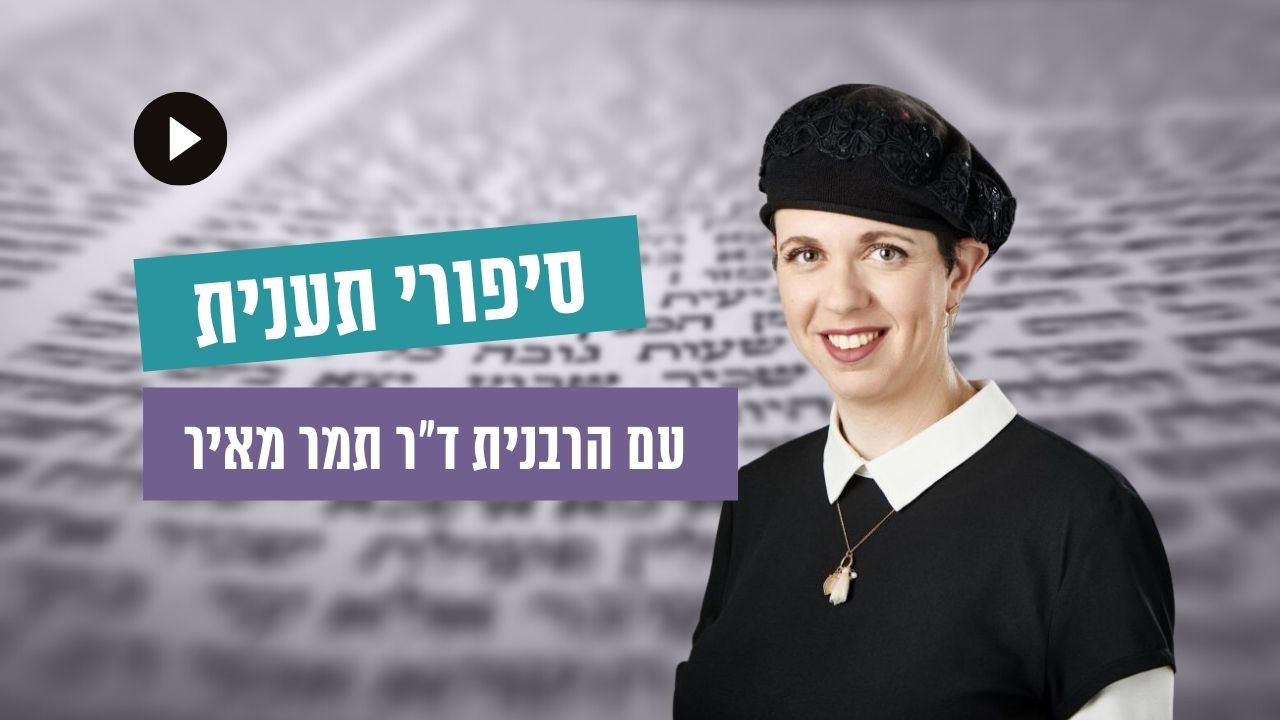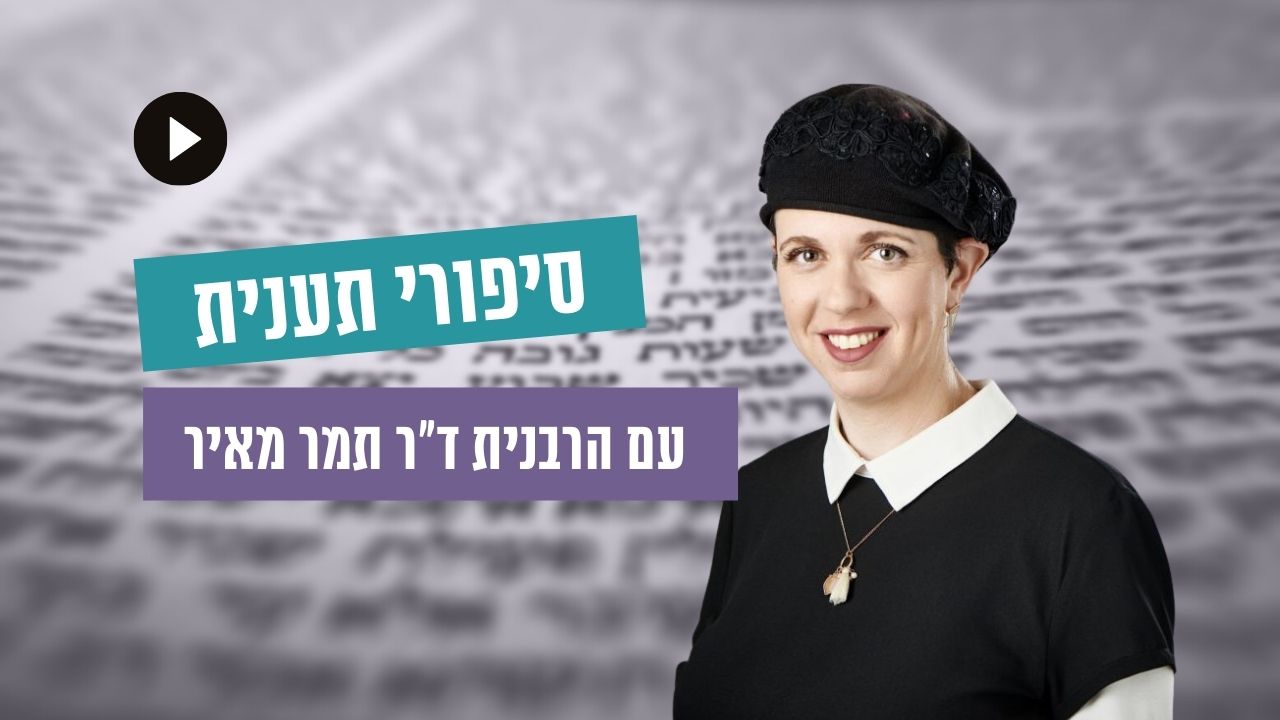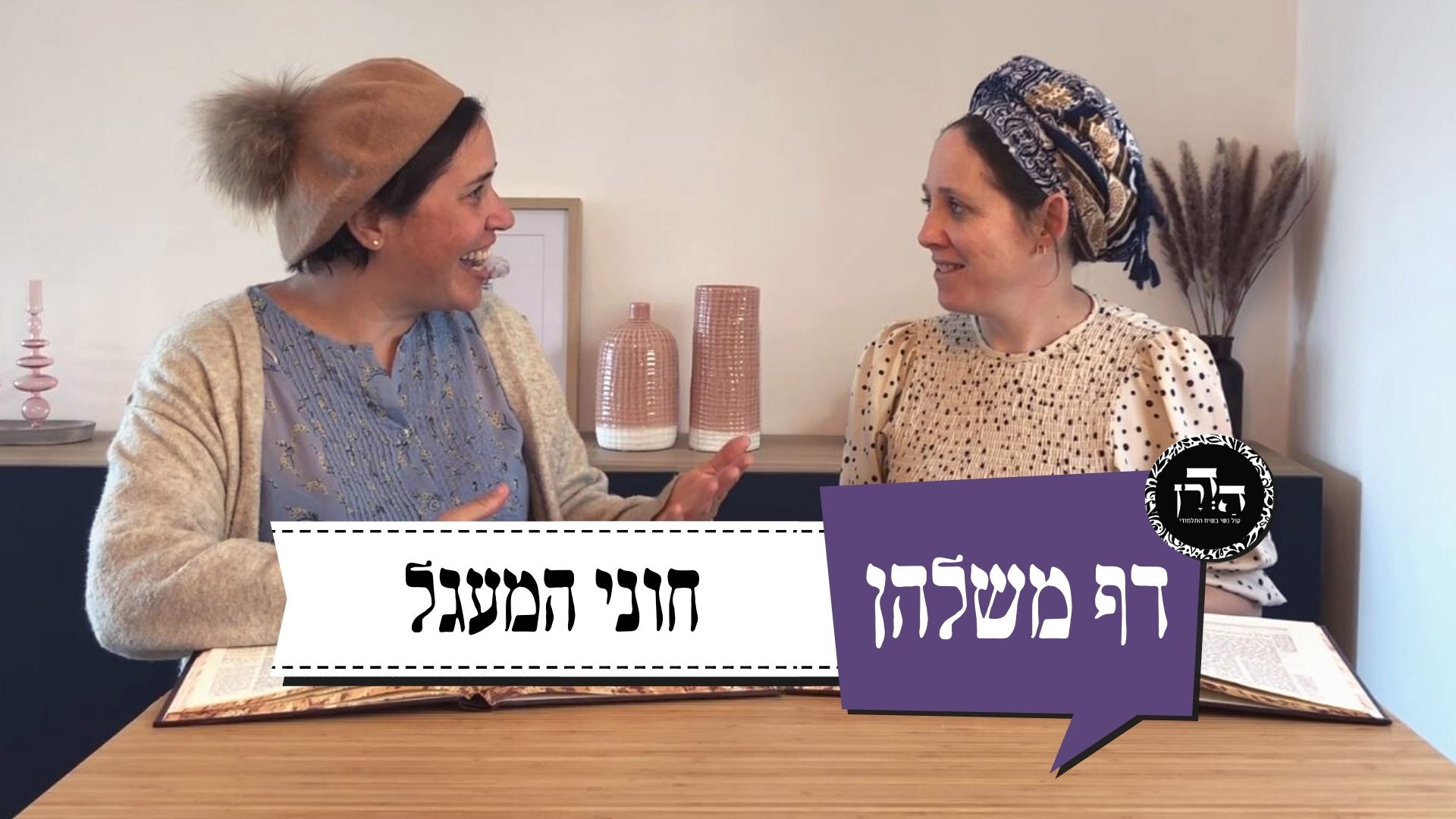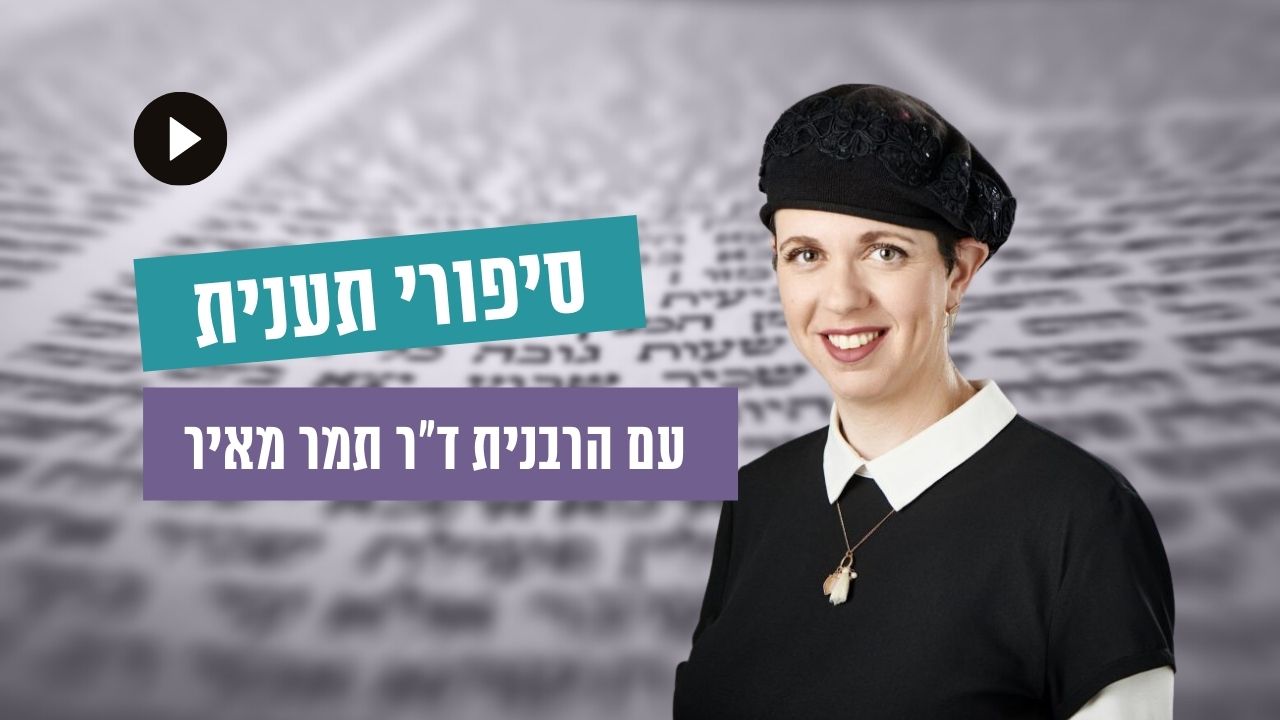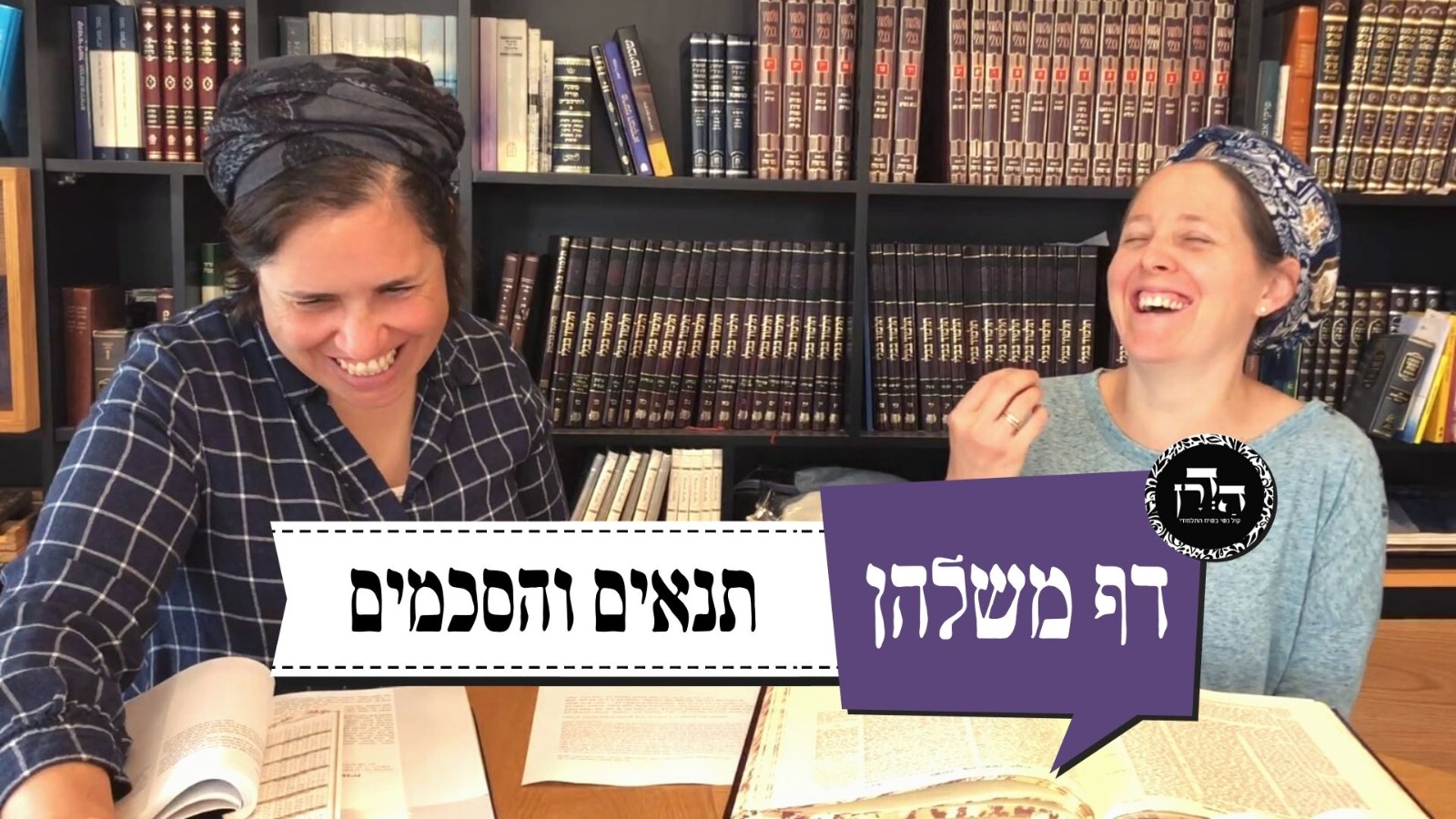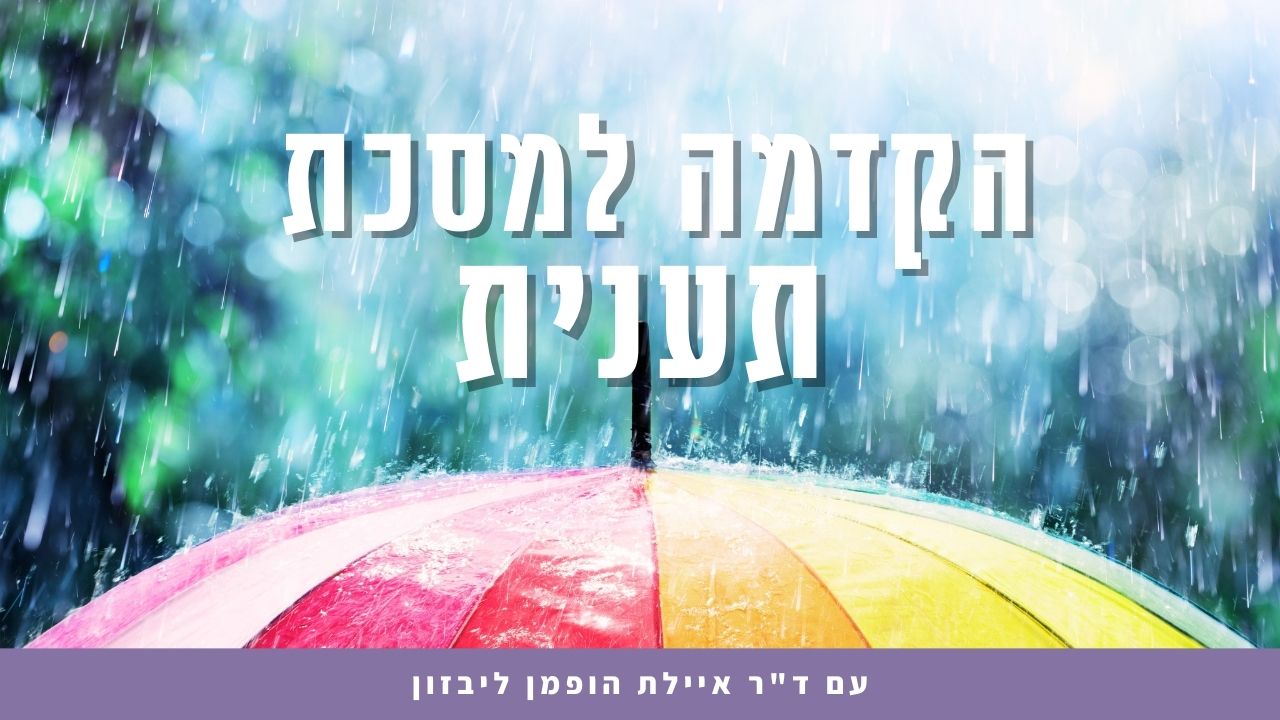הלימוד החודש מוקדש לרפואת פיליס הכט, גיטל פעשא בת מאשה רחל על ידי חברותיה הרבות שאוהבות ומעריכות אותה.
רוצה להקדיש שיעור?

תקציר
הגמרא מביאה כמה מאמרים על חשיבותה של יום גשמים – כיום של תחיית המתים, כיום שניתנה בו תורה, כיום שנבראו שמיים וארץ. בעקרובת הזכרת פסוק בהקשר, הגמרא סוטה מהנושא לדרוש דברים על תלמידי חכמים ועורכים השוואה בין מי שלומד תורה והוא הגון לבין מי שלומד תורה ואינו הגון. או מי שלומד תורה לשמה לבין מי שאינו לומד תורה לשמה. יש חשיבות ללמוד תורה יחד עם אחרים – הגמרא מביאה מאמרים שונים של רבנים שמוכיחה עניין זה מפסוקים וגם את זה שאפשר אפילו לרב ללמוד מתלמידו. התורה מתקיימת רק במי שדעתו שפלה ומוכיחים זאת מסיפור על ר’ יהושע עם בת הקיסר שבו היא שאלה אותו למה יש לו הרבה חכמה אבל הוא כל כך מכוער. הוא אמר לה שדברים טובים נשמרים בכלים מכוערים בגלל החשיבות של ענוה. מתי גשמים יורדים? כשנמחלו עוונותיהם של העם. לאיזה סיבות גשמים לא יורדים? יש כל מיני דעות לענות על שאלה זו על עוונות ספציפיות שגורמות לעצירת גשמים. מה יש לעשות אם יש עצירת גשמים? להתפלל!!
כלים
הלימוד החודש מוקדש לרפואת פיליס הכט, גיטל פעשא בת מאשה רחל על ידי חברותיה הרבות שאוהבות ומעריכות אותה.
כלים
העמקה
רוצה להבין מה באמת קורה מתחת לפני השטח של הסוגיה?
שיעורים, פודקאסטים והרחבות של מיטב המורות שלנו יפתחו לך עוד זוויות וכיווני חשיבה.
חדשה בלימוד הגמרא?
זה הדף הראשון שלך? איזו התרגשות עצומה! יש לנו בדיוק את התכנים והכלים שיעזרו לך לעשות את הצעדים הראשונים ללמידה בקצב וברמה שלך, כך תוכלי להרגיש בנוח גם בתוך הסוגיות המורכבות ומאתגרות.
פסיפס הלומדות שלנו
גלי את קהילת הלומדות שלנו, מגוון נשים, רקעים וסיפורים. כולן חלק מתנועה ומסע מרגש ועוצמתי.
תענית ז
נֵימְרִינְהוּ לְתַרְוַיְיהוּ: ״אֵל הַהוֹדָאוֹת״ וְ״רוֹב הַהוֹדָאוֹת״.
we will recite them both: God of thanksgivings, and: Abundant thanksgivings.
אָמַר רַבִּי אֲבָהוּ: גָּדוֹל יוֹם הַגְּשָׁמִים מִתְּחִיַּית הַמֵּתִים, דְּאִילּוּ תְּחִיַּית הַמֵּתִים — לַצַּדִּיקִים, וְאִילּוּ גְּשָׁמִים — בֵּין לַצַּדִּיקִים בֵּין לָרְשָׁעִים. וּפְלִיגָא דְּרַב יוֹסֵף, דְּאָמַר רַב יוֹסֵף: מִתּוֹךְ שֶׁהִיא שְׁקוּלָה כִּתְחִיַּית הַמֵּתִים — קְבָעוּהָ בִּתְחִיַּית הַמֵּתִים.
§ The Gemara cites statements in praise of rainfall. Rabbi Abbahu said: The day of rain is greater than the resurrection of the dead. The reason is that while the resurrection of the dead benefits only the righteous, rain benefits both the righteous and the wicked. The Gemara comments: And this statement disagrees with the opinion of Rav Yosef, as Rav Yosef said: Since rainfall is equivalent to the resurrection of the dead, the Sages established its recitation in the second blessing of the Amida, the blessing of the resurrection of the dead. According to Rav Yosef, rainfall is the equivalent to, but not superior to, the resurrection of the dead.
אָמַר רַב יְהוּדָה: גָּדוֹל יוֹם הַגְּשָׁמִים כְּיוֹם שֶׁנִּיתְּנָה בּוֹ תּוֹרָה, שֶׁנֶּאֱמַר: ״יַעֲרֹף כַּמָּטָר לִקְחִי״, וְאֵין ״לֶקַח״ אֶלָּא תּוֹרָה, שֶׁנֶּאֱמַר: ״כִּי לֶקַח טוֹב נָתַתִּי לָכֶם תּוֹרָתִי אַל תַּעֲזֹבוּ״. רָבָא אָמַר: יוֹתֵר מִיּוֹם שֶׁנִּיתְּנָה בּוֹ תּוֹרָה, שֶׁנֶּאֱמַר: ״יַעֲרֹף כַּמָּטָר לִקְחִי״, מִי נִתְלֶה בְּמִי? הֱוֵי אוֹמֵר: קָטָן נִתְלֶה בַּגָּדוֹל.
Similarly, Rav Yehuda said: The day of the rains is as great as the day on which the Torah was given, as it is stated: “My doctrine [likḥi] shall drop as the rain” (Deuteronomy 32:2), and lekaḥ means nothing other than Torah, as it is stated: “For I give you good doctrine [lekaḥ]; do not forsake My Torah” (Proverbs 4:2). Rava said: Rainfall is even greater than the day on which the Torah was given, as it is stated: “My doctrine shall drop as the rain,” and when one makes a comparison, which object is made dependent upon which? You must say that the lesser object is dependent upon the greater one. If Torah is compared to rain, it follows that rain is greater than Torah.
רָבָא רָמֵי, כְּתִיב: ״יַעֲרֹף כַּמָּטָר לִקְחִי״, וּכְתִיב: ״תִּזַּל כַּטַּל אִמְרָתִי״! אִם תַּלְמִיד חָכָם הָגוּן הוּא — כַּטַּל, וְאִם לָאו — עוֹרְפֵהוּ כַּמָּטָר.
The Gemara cites another interpretation of the verse from Deuteronomy. Rava raised a contradiction: At the beginning of the verse it is written: “My doctrine shall drop [ya’arof] as the rain,” in a harsh manner, and yet later in the verse, it is written: “My speech shall distill as the dew,” in a gentle tone. He resolves this apparent contradiction as follows: If he is a worthy Torah scholar, the Torah flows through him like the dew, but if he is not worthy, it snaps his neck [orfehu] like the powerful rain.
תַּנְיָא, הָיָה רַבִּי בְּנָאָה אוֹמֵר: כׇּל הָעוֹסֵק בְּתוֹרָה לִשְׁמָהּ — תּוֹרָתוֹ נַעֲשֵׂית לוֹ סַם חַיִּים, שֶׁנֶּאֱמַר: ״עֵץ חַיִּים הִיא לַמַּחֲזִיקִים בָּהּ״, וְאוֹמֵר: ״רִפְאוּת תְּהִי לְשָׁרֶּךָ״, וְאוֹמֵר: ״כִּי מֹצְאִי מָצָא חַיִּים״. וְכׇל הָעוֹסֵק בַּתּוֹרָה שֶׁלֹּא לִשְׁמָהּ — נַעֲשֵׂית לוֹ סַם הַמָּוֶת, שֶׁנֶּאֱמַר: ״יַעֲרֹף כַּמָּטָר לִקְחִי״, וְאֵין עֲרִיפָה אֶלָּא הֲרִיגָה, שֶׁנֶּאֱמַר: ״וְעָרְפוּ שָׁם אֶת הָעֶגְלָה בַּנָּחַל״.
It is taught in a baraita that Rabbi Bena’a would say: Anyone who engages in Torah for its own sake, his Torah study will be an elixir of life for him, as it is stated: “It is a tree of life to them who lay hold upon it” (Proverbs 3:18), and it says: “It shall be health to your navel” (Proverbs 3:8), and it says: “For whoever finds Me finds life” (Proverbs 8:35). And anyone who engages in Torah not for its own sake, e.g., for self-aggrandizement, his Torah will be an elixir of death for him, as it is stated: “My doctrine shall drop [ya’arof ] as the rain,” and arifa means nothing other than killing, as it is stated: “And they shall break the heifer’s neck [arefu] there in the valley” (Deuteronomy 21:4).
אֲמַר לֵיהּ רַבִּי יִרְמְיָה לְרַבִּי זֵירָא: לֵיתֵי מָר לִיתְנֵי. אֲמַר לֵיהּ: חֲלַשׁ לִבַּאי וְלָא יָכֵילְנָא. לֵימָא מָר מִילְּתָא דְּאַגַּדְתָּא, אֲמַר לֵיהּ: הָכִי אָמַר רַבִּי יוֹחָנָן — מַאי דִּכְתִיב: ״כִּי הָאָדָם עֵץ הַשָּׂדֶה״, וְכִי אָדָם עֵץ שָׂדֶה הוּא?
Rabbi Yirmeya once said to Rabbi Zeira: Let the Master come and teach a halakhic discourse. Rabbi Zeira said to him: My heart is weak and I cannot strain myself over a halakhic discourse. Rabbi Yirmeya replied to him: In that case, let the Master tell us a matter of aggada, which does not require as much effort. Rabbi Zeira said to him that Rabbi Yoḥanan said as follows: What is the meaning of that which is written: “For man is a tree of the field” (Deuteronomy 20:19)? And is man actually a tree of the field?
אֶלָּא, מִשּׁוּם דִּכְתִיב: ״כִּי מִמֶּנּוּ תֹאכֵל וְאֹתוֹ לֹא תִכְרֹת״, וּכְתִיב: ״אֹתוֹ תַשְׁחִית וְכָרָתָּ״. הָא כֵּיצַד? אִם תַּלְמִיד חָכָם הָגוּן הוּא — ״מִמֶּנּוּ תֹאכֵל וְאֹתוֹ לֹא תִכְרֹת״, וְאִם לָאו — ״אֹתוֹ תַשְׁחִית וְכָרָתָּ״.
Rather, it is because it is written earlier in the same verse: “You may eat of them but you may not cut them down,” and it is written in the next verse: “Them you may destroy and cut down” (Deuteronomy 20:20). This indicates that there are certain trees which may be cut down, while others may not be destroyed. How so? If a Torah scholar is worthy: “You may eat of them but you may not cut them down,” but if he is not worthy: “He you may destroy and cut down.”
אָמַר רַבִּי חָמָא בְּרַבִּי חֲנִינָא, מַאי דִּכְתִיב: ״בַּרְזֶל בְּבַרְזֶל יָחַד״, לוֹמַר לָךְ: מָה בַּרְזֶל זֶה — אֶחָד מְחַדֵּד אֶת חֲבֵירוֹ, אַף שְׁנֵי תַּלְמִידֵי חֲכָמִים — מְחַדְּדִין זֶה אֶת זֶה בַּהֲלָכָה.
The Gemara cites other expositions that deal with Torah study. Rabbi Ḥama, son of Rabbi Ḥanina, said: What is the meaning of that which is written: “Iron sharpens iron, so a man sharpens the countenance of his friend” (Proverbs 27:17)? This verse comes to tell you that just as with these iron implements, one sharpens the other when they are rubbed against each other, so too, when Torah scholars study together, they sharpen one another in halakha.
אָמַר רַבָּה בַּר בַּר חָנָה: לָמָּה נִמְשְׁלוּ דִּבְרֵי תוֹרָה כָּאֵשׁ, שֶׁנֶּאֱמַר: ״הֲלֹא כֹה דְבָרִי כָּאֵשׁ נְאֻם ה׳״, לוֹמַר לָךְ: מָה אֵשׁ אֵינוֹ דּוֹלֵק יְחִידִי, אַף דִּבְרֵי תוֹרָה אֵין מִתְקַיְּימִין בִּיחִידִי.
Rabba bar bar Ḥana said: Why are matters of Torah compared to fire, as it is stated: “Is not My word like fire, says the Lord” (Jeremiah 23:29)? To tell you: Just as fire does not ignite in a lone stick of wood but in a pile of kindling, so too, matters of Torah are not retained and understood properly by a lone scholar who studies by himself, but by a group of Sages.
וְהַיְינוּ דְּאָמַר רַבִּי יוֹסֵי בַּר חֲנִינָא, מַאי דִּכְתִיב: ״חֶרֶב אֶל הַבַּדִּים וְנֹאָלוּ״, חֶרֶב עַל שׂוֹנְאֵיהֶן שֶׁל תַּלְמִידֵי חֲכָמִים שֶׁעוֹסְקִין בַּד בְּבַד בַּתּוֹרָה. וְלֹא עוֹד אֶלָּא שֶׁמִּטַּפְּשִׁין, שֶׁנֶּאֱמַר: ״וְנֹאָלוּ״.
And this is what Rabbi Yosei bar Ḥanina said: What is the meaning of that which is written: “A sword is upon the boasters [habaddim], and they shall become fools [noalu]” (Jeremiah 50:36)? This verse can be interpreted homiletically: There is a sword upon the enemies of Torah scholars, a euphemism for Torah scholars themselves, who sit alone [bad bevad] and study Torah. And not only that, but those who study by themselves grow foolish from their solitary Torah study, as it is stated: “And they shall become fools.”
וְלֹא עוֹד, אֶלָּא שֶׁחוֹטְאִין. כְּתִיב הָכָא: ״וְנֹאָלוּ״, וּכְתִיב הָתָם: ״אֲשֶׁר נוֹאַלְנוּ וַאֲשֶׁר חָטָאנוּ״. וְאִיבָּעֵית אֵימָא — מֵהָכָא: ״נוֹאֲלוּ שָׂרֵי צֹעַן [וְגוֹ׳] הִתְעוּ אֶת מִצְרַיִם״.
And not only that, but they sin, as it is written here: “And they shall become fools,” and it is written there: “For that we have done foolishly [noalnu] and for that we have sinned” (Numbers 12:11). And if you wish, say instead that it is derived from here: “The princes of Zoan have become fools [noalu]…they have caused Egypt to go astray” (Isaiah 19:13).
אָמַר רַב נַחְמָן בַּר יִצְחָק: לָמָּה נִמְשְׁלוּ דִּבְרֵי תוֹרָה כְּעֵץ, שֶׁנֶּאֱמַר: ״עֵץ חַיִּים הִיא לַמַּחֲזִיקִים בָּהּ״, לוֹמַר לָךְ: מָה עֵץ קָטָן מַדְלִיק אֶת הַגָּדוֹל, אַף תַּלְמִידֵי חֲכָמִים קְטַנִּים מְחַדְּדִים אֶת הַגְּדוֹלִים. וְהַיְינוּ דְּאָמַר רַבִּי חֲנִינָא: הַרְבֵּה לָמַדְתִּי מֵרַבּוֹתַי, וּמֵחֲבֵירַי יוֹתֵר מֵרַבּוֹתַי, וּמִתַּלְמִידַי יוֹתֵר מִכּוּלָּן.
Rav Naḥman bar Yitzḥak said: Why are Torah matters likened to a tree, as it is stated: “It is a tree of life to them who lay hold upon it” (Proverbs 3:18)? This verse comes to tell you that just as a small piece of wood can ignite a large piece, so too, minor Torah scholars can sharpen great Torah scholars and enable them to advance in their studies. And this is what Rabbi Ḥanina said: I have learned much from my teachers and even more from my friends, but from my students I have learned more than from all of them.
רַבִּי חֲנִינָא בַּר פָּפָּא רָמֵי: כְּתִיב ״לִקְרַאת צָמֵא הֵתָיוּ מָיִם״, וּכְתִיב: ״הוֹי כׇּל צָמֵא לְכוּ לַמַּיִם״. אִם תַּלְמִיד הָגוּן הוּא — ״לִקְרַאת צָמֵא הֵתָיוּ מַיִם״, וְאִי לָא — ״הוֹי כׇּל צָמֵא לְכוּ לַמַּיִם״.
Rabbi Ḥanina bar Pappa raised a contradiction. In one verse it is written: “To him who is thirsty bring water” (Isaiah 21:14), which indicates that the one who has water must bring it to the thirsty person, and it is written elsewhere: “Ho, everyone who thirsts, come for water” (Isaiah 55:1), from which it may be inferred that the thirsty person must seek out water himself. Rabbi Ḥanina bar Pappa resolves this apparent contradiction by explaining that if he is a worthy student the teacher must seek him out, as in “to him who is thirsty bring water,” but if the student is not worthy, then “Ho, everyone who thirsts, come for water,” i.e., this student must seek out a teacher himself.
רַבִּי חֲנִינָא בַּר חָמָא רָמֵי: כְּתִיב ״יָפוּצוּ מַעְיְנֹתֶיךָ חוּצָה״, וּכְתִיב: ״יִהְיוּ לְךָ לְבַדֶּךָ״. אִם תַּלְמִיד הָגוּן הוּא — ״יָפוּצוּ מַעְיְנֹתֶיךָ חוּצָה״, וְאִם לָאו — ״יִהְיוּ לְךָ לְבַדֶּךָ״.
Rabbi Ḥanina bar Ḥama raised another contradiction. In one verse it is written: “Let your springs be dispersed abroad” (Proverbs 5:16), whereas in the next verse it is written: “Let them be your own” (Proverbs 5:17). Rabbi Ḥanina bar Ḥama explains: If the student sitting before you is worthy, then “Let your springs be dispersed abroad,” as you should teach him, but if he is not worthy, then “Let them be your own.”
וְאָמַר רַבִּי חֲנִינָא בַּר אִידִי: לָמָּה נִמְשְׁלוּ דִּבְרֵי תוֹרָה לְמַיִם, דִּכְתִיב: ״הוֹי כׇּל צָמֵא לְכוּ לַמַּיִם״, לוֹמַר לָךְ: מָה מַיִם מַנִּיחִין מָקוֹם גָּבוֹהַּ וְהוֹלְכִין לְמָקוֹם נָמוּךְ, אַף דִּבְרֵי תוֹרָה אֵין מִתְקַיְּימִין אֶלָּא בְּמִי שֶׁדַּעְתּוֹ שְׁפָלָה.
And Rabbi Ḥanina bar Idi said: Why are matters of Torah likened to water, as it is written: “Ho, everyone who thirsts, come for water” (Isaiah 55:1)? This verse comes to tell you: Just as water leaves a high place and flows to a low place, so too, Torah matters are retained only by one whose spirit is lowly, i.e., a humble person.
וְאָמַר רַבִּי אוֹשַׁעְיָא: לָמָּה נִמְשְׁלוּ דִּבְרֵי תוֹרָה לִשְׁלֹשָׁה מַשְׁקִין הַלָּלוּ: בְּמַיִם, וּבְיַיִן, וּבְחָלָב. דִּכְתִיב: ״הוֹי כׇּל צָמֵא לְכוּ לַמַּיִם״, וּכְתִיב: ״לְכוּ שִׁבְרוּ וֶאֱכֹלוּ וּלְכוּ שִׁבְרוּ בְּלוֹא כֶסֶף וּבְלוֹא מְחִיר יַיִן וְחָלָב״, לוֹמַר לָךְ: מָה שְׁלֹשָׁה מַשְׁקִין הַלָּלוּ אֵין מִתְקַיְּימִין אֶלָּא בַּפָּחוּת שֶׁבַּכֵּלִים — אַף דִּבְרֵי תוֹרָה אֵין מִתְקַיְּימִין אֶלָּא בְּמִי שֶׁדַּעְתּוֹ שְׁפָלָה.
And Rabbi Oshaya said: Why are matters of Torah likened to these three liquids: To water, wine and milk? As it is written with regard to water: “Ho, everyone who thirsts, come for water,” and it is written in the same verse: “Come, buy and eat; yea, come, buy wine and milk without money and without price.” This verse comes to tell you: Just as these three liquids can be retained only in the least of vessels, e.g., clay pots, but not vessels of silver and gold, as they will spoil, so too, matters of Torah are retained only by one whose spirit is lowly.
כְּדַאֲמַרָה לֵיהּ בְּרַתֵּיה דְּקֵיסָר לְרַבִּי יְהוֹשֻׁעַ בֶּן חֲנַנְיָה: אִי חׇכְמָה מְפוֹאָרָה בִּכְלִי מְכוֹעָר! אֲמַר לַהּ: אָבִיךָ רָמֵי חַמְרָא בְּמָנֵי דְפַחְרָא? אֲמַרָה לֵיהּ: אֶלָּא בְּמַאי נִירְמֵי? אֲמַר לַהּ: אַתּוּן דַּחֲשִׁיבִיתוּ, רְמוֹ בְּמָאנֵי דַּהֲבָא וְכַסְפָּא.
The Gemara cites a related incident: This is as the daughter of the Roman emperor said to Rabbi Yehoshua ben Ḥananya, who was an ugly man: Woe to glorious wisdom such as yours, which is contained in an ugly vessel. Rabbi Yehoshua ben Ḥananya said to her, in a seemingly unrelated response: Does your father keep his wine in simple clay vessels? The emperor’s daughter said to him: Rather, in what, then, should he keep it? Rabbi Yehoshua ben Ḥananya said to her: You, who are so important, should put it in vessels of gold and silver.
אֲזַלָה וַאֲמַרָה לֵיהּ לַאֲבוּהּ רַמְיֵיהּ לְחַמְרָא בְּמָנֵי דַּהֲבָא וְכַסְפָּא, וּתְקֵיף. אֲתוֹ וַאֲמַרוּ לֵיהּ. אֲמַר לַהּ לִבְרַתֵּיהּ: מַאן אֲמַר לָךְ הָכִי? אֲמַרָה לֵיהּ: רַבִּי יְהוֹשֻׁעַ בֶּן חֲנַנְיָה. קַרְיוּהוּ. אֲמַר לֵיהּ: אַמַּאי אֲמַרְתְּ לַהּ הָכִי? אֲמַר לֵיהּ: כִּי הֵיכִי דַּאֲמַרָה לִי, אֲמַרִי לַהּ. וְהָא אִיכָּא שַׁפִּירֵי דִּגְמִירִי!
The emperor’s daughter went and said this to her father. He put the wine in vessels of gold and silver and it turned sour. When his advisors came and told the emperor that the wine had turned sour, he said to his daughter: Who told you to do this? His daughter responded: Rabbi Yehoshua ben Ḥananya. The emperor summoned him and said to him: Why did you say this to her? Rabbi Yehoshua ben Ḥananya said to him: Just as she said to me, so I said say to her, to demonstrate to her that fine material is best preserved in the least of vessels. The emperor said to him: But there are handsome people who are learned.
אִי הֲווֹ סְנוּ — טְפֵי הֲווֹ גְּמִירִי. דָּבָר אַחֵר: מָה שְׁלֹשָׁה מַשְׁקִין הַלָּלוּ אֵין נִפְסָלִין אֶלָּא בְּהֶיסַּח הַדַּעַת — אַף דִּבְרֵי תוֹרָה אֵין מִשְׁתַּכְחִין אֶלָּא בְּהֶיסַּח הַדַּעַת.
Rabbi Yehoshua replied: Had they been ugly, they would have been even more learned. Alternatively, the Torah is likened to water, wine, and milk because just as these three liquids are spoiled only by diversion of attention, so too, are Torah matters forgotten only through diversion of attention. If water, wine and milk are guarded, they will not spoil or have dirty objects fall into them.
אָמַר רַבִּי חָמָא בְּרַבִּי חֲנִינָא: גָּדוֹל יוֹם הַגְּשָׁמִים כְּיוֹם שֶׁנִּבְרְאוּ שָׁמַיִם וָאָרֶץ, שֶׁנֶּאֱמַר: ״הַרְעִיפוּ שָׁמַיִם מִמַּעַל וּשְׁחָקִים יִזְּלוּ צֶדֶק תִּפְתַּח אֶרֶץ וְיִפְרוּ יֶשַׁע וּצְדָקָה תַצְמִיחַ יַחַד אֲנִי ה׳ בְּרָאתִיו״. ״בְּרָאתִים״ לֹא נֶאֱמַר, אֶלָּא ״בְּרָאתִיו״.
§ The Gemara returns to the issue of rain. Rabbi Ḥama, son of Rabbi Ḥanina, said: The day of the rains is as great as the day on which the heavens and earth were created, as it is stated: “Drop down, heavens, from above, let the skies pour down righteousness; let the earth open that they may bring forth salvation, and let it cause righteousness to spring up together; I, the Lord, have created it” (Isaiah 45:8). The Gemara explains that the verse does not say: I have created them, in the plural, but: I have created it. In other words, the verse is referring to rain, rather than to the heavens and the earth, which indicates that rainfall is as important as the creation of the world.
אָמַר רַב אוֹשַׁעְיָא: גָּדוֹל יוֹם הַגְּשָׁמִים, שֶׁאֲפִילּוּ יְשׁוּעָה פָּרָה וְרָבָה בּוֹ, שֶׁנֶּאֱמַר: ״תִּפְתַּח אֶרֶץ וְיִפְרוּ יֶשַׁע״. אָמַר רַבִּי תַּנְחוּם בַּר חֲנִילַאי: אֵין הַגְּשָׁמִים יוֹרְדִים אֶלָּא אִם כֵּן נִמְחֲלוּ עֲוֹנוֹתֵיהֶן שֶׁל יִשְׂרָאֵל, שֶׁנֶּאֱמַר: ״רָצִיתָ ה׳ אַרְצֶךָ שַׁבְתָּ שְׁבִית יַעֲקֹב. נָשָׂאתָ עֲוֹן עַמֶּךָ כִּסִּיתָ כׇל חַטָּאתָם סֶלָה״.
Rabbi Oshaya likewise said: The day of rain is great, as rain even facilitates salvation, which is fruitful and multiplies on that day. It is a time of God’s favor, when salvation is brought forth into the world, as it is stated: “Let the earth open that they may bring forth salvation” (Isaiah 45:8). Rabbi Tanḥum bar Ḥanilai said: Rain falls only if the Jewish people’s transgressions have been forgiven, as it is stated: “Lord, You have been favorable to Your land; You have turned the captivity of Jacob; You have forgiven the iniquity of Your people; You have pardoned all their sin. Selah” (Psalms 85:2–3). This chapter proceeds to discuss rainfall: “And righteousness has looked down from Heaven” (Psalms 85:12), in the form of rain.
אֲמַר לֵיהּ זְעֵירִי מִדִּיהֲבַת לְרָבִינָא: אַתּוּן, מֵהָכָא מַתְנִיתוּ לַהּ. אֲנַן, מֵהָכָא מַתְנֵינַן לַהּ: ״וְאַתָּה תִּשְׁמַע הַשָּׁמַיִם וְסָלַחְתָּ לְחַטָּאת וְגוֹ׳״.
The Sage Ze’iri from the town of Dihavat said to Ravina: You learned this idea from here, whereas we learned it from here, a different verse: “When heaven is closed up, and there is no rain, when they sin against You, if they pray toward this place and confess Your name and turn from their sin, when You afflict them, then You, hear in heaven and forgive the sin of Your servants and of Your people Israel, when You teach them the good way in which they should walk, and send rain upon Your land, which You have given to Your people as an inheritance” (I Kings 8:35–36).
אָמַר רַבִּי תַּנְחוּם בְּרֵיהּ דְּרַבִּי חִיָּיא אִישׁ כְּפַר עַכּוֹ: אֵין הַגְּשָׁמִים נֶעֱצָרִין אֶלָּא אִם כֵּן נִתְחַיְּיבוּ שׂוֹנְאֵיהֶן שֶׁל יִשְׂרָאֵל כְּלָיָה, שֶׁנֶּאֱמַר: ״צִיָּה גַם חֹם יִגְזְלוּ מֵימֵי שֶׁלֶג שְׁאוֹל חָטָאוּ״. אֲמַר לֵיהּ זְעֵירִי מִדִּיהֲבַת לְרָבִינָא: אַתּוּן, מֵהָכָא מַתְנִיתוּ לַהּ. אֲנַן, מֵהָכָא מַתְנֵינַן לַהּ: ״וְעָצַר אֶת הַשָּׁמַיִם וַאֲבַדְתֶּם מְהֵרָה״.
Rabbi Tanḥum, son of Rabbi Ḥiyya of the village of Akko, said: The rains are withheld only if the enemies of the Jewish people, a euphemism for the Jewish people, have been sentenced to destruction for their sins, as it is stated: “Drought and heat will steal the snow waters; to the grave those who have sinned” (Job 24:19). According to this interpretation, snow water will be stolen by drought, i.e., there will be none available, when people have sinned to the point that they deserve the grave. Ze’iri from Dihavat said to Ravina: You learned this idea from here; we learned it from here: “And the anger of the Lord will be kindled against you, and He will close up the heavens, and there will be no rain, and the earth will not give its fruit, and you will perish quickly” (Deuteronomy 11:17).
אָמַר רַב חִסְדָּא: אֵין הַגְּשָׁמִים נֶעֱצָרִין אֶלָּא בִּשְׁבִיל בִּיטּוּל תְּרוּמוֹת וּמַעַשְׂרוֹת, שֶׁנֶּאֱמַר: ״צִיָּה גַם חֹם יִגְזְלוּ מֵימֵי שֶׁלֶג״. מַאי מַשְׁמַע? תָּנָא דְּבֵי רַבִּי יִשְׁמָעֵאל: בִּשְׁבִיל דְּבָרִים שֶׁצִּוִּיתִי אֶתְכֶם בִּימוֹת הַחַמָּה וְלֹא עֲשִׂיתֶם — יִגָּזְלוּ מִכֶּם מֵימֵי שֶׁלֶג בִּימוֹת הַגְּשָׁמִים.
Rav Ḥisda said: The rains are withheld only due to the sin of the nullification of teruma and tithes, as it is stated: “Drought and heat will steal the snow waters” (Job 24:19). The Gemara asks: From where in the verse may this idea be inferred from the verse? The school of Rabbi Yishmael taught: Due to matters that I have commanded you to do in the summer, e.g., take teruma and tithes from the summer produce, and that you did not do, the snow waters will be stolen from you in the rainy season.
אָמַר רַבִּי שִׁמְעוֹן בֶּן פַּזִּי: אֵין הַגְּשָׁמִים נֶעֱצָרִין אֶלָּא בִּשְׁבִיל מְסַפְּרֵי לָשׁוֹן הָרָע, שֶׁנֶּאֱמַר: ״רוּחַ צָפוֹן תְּחוֹלֵל גָּשֶׁם וּפָנִים נִזְעָמִים לְשׁוֹן סָתֶר״.
Rabbi Shimon ben Pazi said: The rains are withheld only due to the sin of those who speak slander, as it is stated: “The north wind brings forth rain, but a backbiting tongue, an angry countenance” (Proverbs 25:23). This verse indicates that if the countenance of the heavens is angry, with neither clouds nor rain, it is due to slanderous speech.
אָמַר רַב סַלָּא אָמַר רַב הַמְנוּנָא: אֵין הַגְּשָׁמִים נֶעֱצָרִין אֶלָּא בִּשְׁבִיל עַזֵּי פָנִים, שֶׁנֶּאֱמַר: ״וַיִּמָּנְעוּ רְבִבִים וּמַלְקוֹשׁ לוֹא הָיָה וּמֵצַח אִשָּׁה זוֹנָה הָיָה לָךְ וְגוֹ׳״. וְאָמַר רַב סַלָּא אָמַר רַב הַמְנוּנָא: כׇּל אָדָם שֶׁיֵּשׁ לוֹ עַזּוּת פָּנִים — סוֹף נִכְשָׁל בַּעֲבֵירָה, שֶׁנֶּאֱמַר: ״וּמֵצַח אִשָּׁה זוֹנָה הָיָה לָךְ״. רַב נַחְמָן אָמַר: בְּיָדוּעַ שֶׁנִּכְשַׁל בַּעֲבֵירָה, שֶׁנֶּאֱמַר: ״הָיָה לָךְ״, וְלֹא נֶאֱמַר ״יִהְיֶה לָּךְ״.
Rav Salla said that Rav Hamnuna said: The rains are withheld only due to impudent people, as it is stated: “Therefore the showers have been withheld, and there has been no last rain, yet you had a harlot’s forehead, you refused to be ashamed” (Jeremiah 3:3). And Rav Salla said that Rav Hamnuna said, with regard to the same verse: Any man who is insolent will ultimately stumble over the transgression of prostitution, as it is stated: “Yet you had a prostitute’s forehead.” Rav Naḥman said: The verse does not mean that he will commit a sexual transgression in the future; rather, it is known that he has already stumbled over this transgression, as it is stated: “You had,” in the past tense, and it is not stated: You will.
אָמַר רַבָּה בַּר רַב הוּנָא: כׇּל אָדָם שֶׁיֵּשׁ לוֹ עַזּוּת פָּנִים — מוּתָּר לִקְרוֹתוֹ רָשָׁע, שֶׁנֶּאֱמַר: ״הֵעֵז אִישׁ רָשָׁע בְּפָנָיו״. רַב נַחְמָן בַּר יִצְחָק אָמַר: מוּתָּר לִשְׂנאוֹתוֹ, שֶׁנֶּאֱמַר: ״וְעֹז פָּנָיו יְשֻׁנֶּא״. אַל תִּקְרֵי ״יְשֻׁנֶּא״, אֶלָּא ״יִשָּׂנֵא״.
Rabba bar Rav Huna said: With regard to any man who is insolent, it is permitted to call him wicked to his face, as it is stated: “A wicked man makes his face insolent” (Proverbs 21:29). Rav Naḥman bar Yitzḥak said: It is permitted to hate him, as it is stated: “And the insolence of his face is changed” (Ecclesiastes 8:1). Do not read it as: “Is changed [yeshunne]”; rather, read it as: Is hated [yissane], as the two words are spelled the same way in Hebrew, albeit with different vocalization and pronunciation.
אָמַר רַב קַטִּינָא: אֵין הַגְּשָׁמִים נֶעֱצָרִין אֶלָּא בִּשְׁבִיל בִּיטּוּל תּוֹרָה, שֶׁנֶּאֱמַר: ״בַּעֲצַלְתַּיִם יִמַּךְ הַמְּקָרֶה״ — בִּשְׁבִיל עַצְלוּת שֶׁהָיָה בְּיִשְׂרָאֵל שֶׁלֹּא עָסְקוּ בַּתּוֹרָה — נַעֲשֶׂה שׂוֹנְאוֹ שֶׁל הַקָּדוֹשׁ בָּרוּךְ הוּא מָךְ. וְאֵין ״מָךְ״ אֶלָּא עָנִי, שֶׁנֶּאֱמַר: ״וְאִם מָךְ הוּא מֵעֶרְכֶּךָ״. וְאֵין ״מְקָרֶה״ אֶלָּא הַקָּדוֹשׁ בָּרוּךְ הוּא, שֶׁנֶּאֱמַר: ״הַמְקָרֶה בַמַּיִם עֲלִיּוֹתָיו״.
Rav Ketina said: The rains are withheld only due to the sin of dereliction in the study of Torah, as it is stated: “By slothfulness the rafters [hamekare] will sink in [yimakh], and through idleness of the hands the house leaks” (Ecclesiastes 10:18). Due to slothfulness that was present amongst the Jewish people, that they did not occupy themselves with Torah, the enemy of the Holy One, Blessed be He, a euphemism for God Himself, has sunk. And sunk [makh] means nothing other than poor, as it is stated: “But if he is too poor [makh] for your valuation” (Leviticus 27:8). And “rafters [mekare]” means nothing other than a reference to the Holy One, Blessed be He, as it is stated: “Who lays the beams [hamekare] of Your upper chambers in the water” (Psalms 104:3).
רַב יוֹסֵף אָמַר, מֵהָכָא: ״וְעַתָּה לֹא רָאוּ אוֹר בָּהִיר הוּא בַּשְּׁחָקִים וְרוּחַ עָבְרָה וַתְּטַהֲרֵם״, וְאֵין ״אוֹר״ אֶלָּא תּוֹרָה, שֶׁנֶּאֱמַר: ״כִּי נֵר מִצְוָה וְתוֹרָה אוֹר״ — ״בָּהִיר הוּא בַּשְּׁחָקִים״. תָּנָא דְּבֵי רַבִּי יִשְׁמָעֵאל: אֲפִילּוּ בְּשָׁעָה שֶׁרָקִיעַ נַעֲשֶׂה בְּהוֹרִין בְּהוֹרִין לְהוֹרִיד טַל וּמָטָר — ״רוּחַ עָבְרָה וַתְּטַהֲרֵם״.
Rav Yosef said that this idea is derived from here: “And now that men do not see the light, it is bright in the skies, but the wind passes and cleanses them” (Job 37:21). And “light” means nothing other than Torah, as it is stated: “For a mitzva is a lamp and Torah is a light” (Proverbs 6:23). According to this interpretation, the verse means that when “men do not see the light,” i.e., when they are not occupied with Torah, “it is bright in the skies,” as there are no rainclouds. With regard to this verse, the school of Rabbi Yishmael taught: Even when the sky is comprised of bright clouds that serve to bring down dew and rain, no rain will fall, as “the wind passes and cleanses them.”
אָמַר רַבִּי אַמֵּי: אֵין הַגְּשָׁמִים נֶעֱצָרִין אֶלָּא בַּעֲוֹן גָּזֵל, שֶׁנֶּאֱמַר: ״עַל כַּפַּיִם כִּסָּה אוֹר״. בַּעֲוֹן כַּפַּיִם — כִּסָּה אוֹר. וְאֵין ״כַּפַּיִם״ אֶלָּא חָמָס, שֶׁנֶּאֱמַר: ״וּמִן הֶחָמָס אֲשֶׁר בְּכַפֵּיהֶם״, וְאֵין ״אוֹר״ אֶלָּא מָטָר, שֶׁנֶּאֱמַר: ״יָפִיץ עֲנַן אוֹרוֹ״.
Rabbi Ami said: The rains are withheld only due to the sin of robbery, as it is stated: “He covers His hands with the light, and He has commanded it due to imploring” (Job 36:32). This means that due to the sin of stealing hands, God has covered the light and no rain will fall. And Rabbi Ami adds that the term “hand” means nothing other than a sin of violence, as it is stated: “And from the violence that is in their hands” (Jonah 3:8). And “light” means nothing other than rain, as it is stated: “He spreads abroad the cloud of His light” (Job 37:11).
מַאי תַּקַּנְתֵּיהּ — יַרְבֶּה בִּתְפִלָּה, שֶׁנֶּאֱמַר: ״וַיְצַו עָלֶיהָ בְּמַפְגִּיעַ״, וְאֵין ״פְּגִיעָה״ אֶלָּא תְּפִלָּה, שֶׁנֶּאֱמַר: ״וְאַתָּה אַל תִּתְפַּלֵּל בְּעַד הָעָם הַזֶּה וְגוֹ׳ וְאַל תִּפְגַּע בִּי״.
What is the remedy of one who has caused the rain to be withheld? He should increase his prayers, as it is stated in the same chapter: “And He has commanded it due to imploring” (Job 36:32), and “imploring” means nothing other than prayer, as it is stated: “Therefore, do not pray you for this nation, neither lift up cry nor prayer for them, neither implore Me” (Jeremiah 7:16).
וְאָמַר רַבִּי אַמֵּי, מַאי דִּכְתִיב: ״אִם קֵהָה הַבַּרְזֶל וְהוּא לֹא פָנִים קִלְקַל״, אִם רָאִיתָ רָקִיעַ שֶׁקֵּיהָה כַּבַּרְזֶל מִלְּהוֹרִיד טַל וּמָטָר — בִּשְׁבִיל מַעֲשֵׂה הַדּוֹר שֶׁהֵן מְקוּלְקָלִין, שֶׁנֶּאֱמַר: ״וְהוּא לֹא פָנִים קִלְקַל״.
And Rabbi Ami said: What is the meaning of that which is written: “If the iron is blunt, and does not whet the edge” (Ecclesiastes 10:10)? If you see a sky that is blunt as iron, in that it does not bring down dew and rain, this is due to the deeds of the generation, which are corrupt, as it is stated: “And does not whet [kilkal] the edge [panim].” Panim, which also means face, is often used in reference to the leaders of a generation, while the term kilkal is similar to the word for corrupt, mekulkalin.
מָה תַּקָּנָתָן — יִתְגַּבְּרוּ בְּרַחֲמִים, שֶׁנֶּאֱמַר: ״וַחֲיָלִים יְגַבֵּר וְיִתְרוֹן הַכְשֵׁיר חׇכְמָה״, כׇּל שֶׁכֵּן אִם הוּכְשְׁרוּ מַעֲשֵׂיהֶן מֵעִיקָּרָא.
What is their remedy? They must increase their prayers for mercy, as it is stated in the same verse: “Then must he increase his strength, but wisdom is profitable to direct” (Ecclesiastes 10:10). This verse hints that rain will fall if one increases his strength, i.e., his prayers for mercy. The last part of the verse means that, all the more so, if their deeds had been righteous and direct from the beginning, the rains would not have been withheld.
רֵישׁ לָקִישׁ אָמַר: אִם רָאִיתָ תַּלְמִיד
The Gemara cites a different interpretation of the same verse. Reish Lakish said: If you see a student
